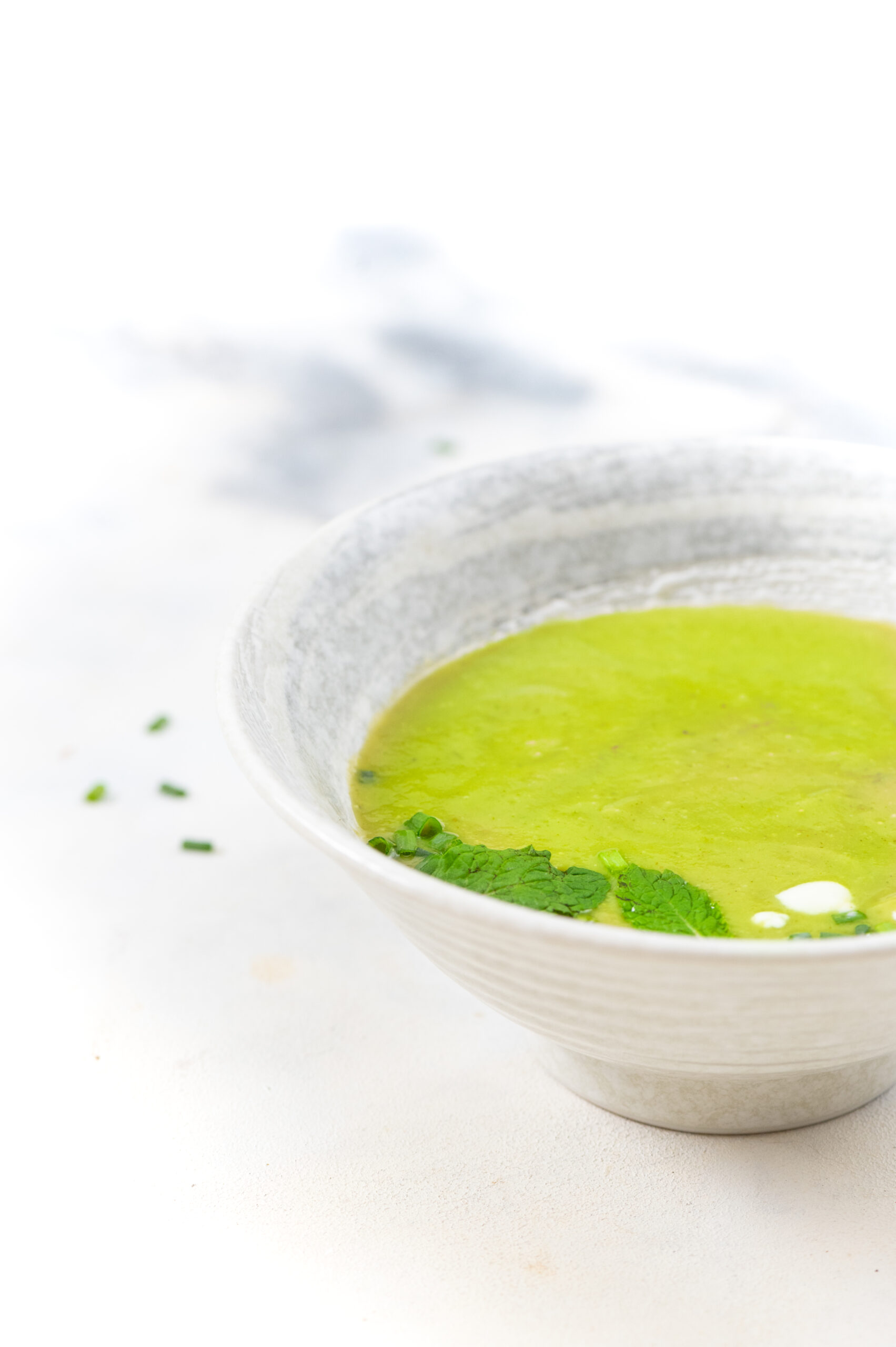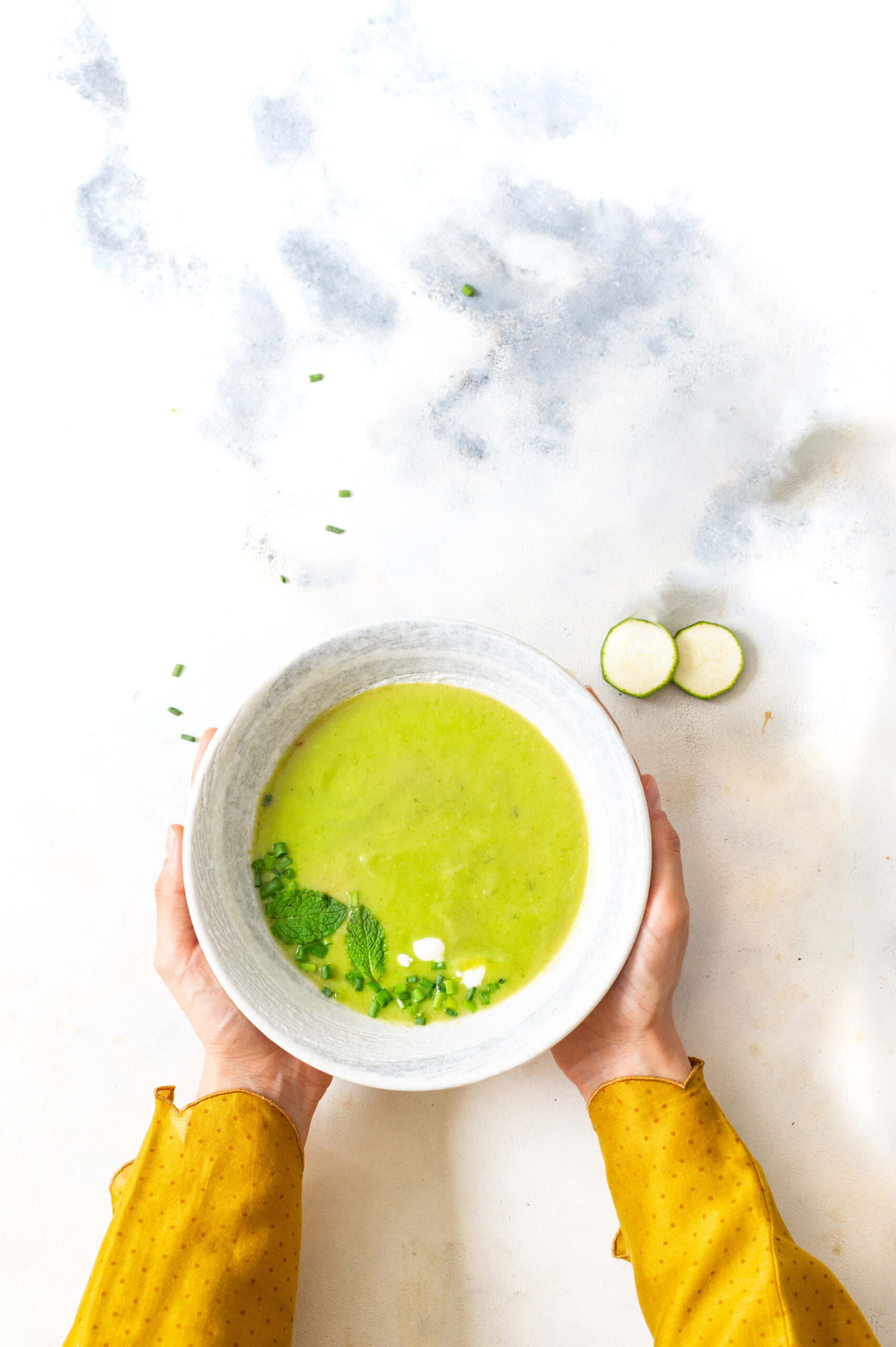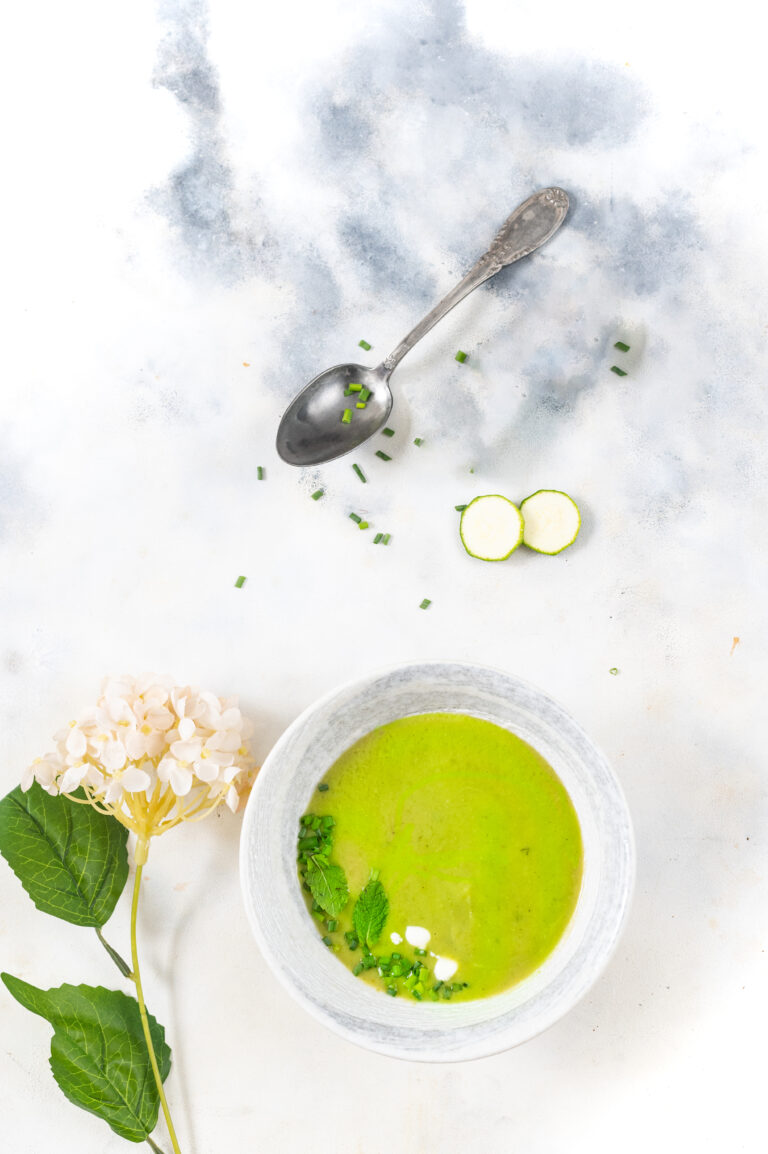The first time that I tasted this sublime soup was when I was visiting a dear friend who was unwell at home. Valli Subbiah is an amazing person with an exceptional gift with kids, and even though she was feeling poorly, her hospitality was as gracious as ever. She offered us this simple, flavourful zucchini soup in mugs. At her place, what was served was more of a hot beverage than a soup, but I made it in a thicker consistency when I tried replicating it at home. Valli was sweet enough to share the recipe with me, and we are both happy to share it with you today.
I’m not a great fan of zucchini, so the fact that this dish captured my heart says a lot about how tasty it is. Since having this soup, I’ve been reading up about the vegetable (well, technically it’s a fruit – did you know?) and am delighted to have found a way to consume something that’s so good for us. It is excellent in supporting or easing menopause and post-menopausal health concerns, and is rich in fibre, folate, Vitamin C and a host of other nutrients.
Zucchini is native to South America, which naturally meant that European colonials began to export and cultivate it too. It’s a late addition to Indian markets, but it’s well-suited to our climes and has a fast growing period, which has made it become popular on our menus over the last decade. I certainly never had it while growing up, and am glad it’s so easily available now. Its novelty to us is revealed in the fact that we don’t have names for it in our own languages. If we are non-English speakers, we just call it “jukini” or “jugni”, in our Indian accents!
Despite the main ingredient being of foreign origin, the most interesting part of this recipe is the distinctly South Indian twist. I love the kick that curry masala gives this soup. It seasons the dish without overpowering the taste of the zucchini. I like dishes which can be subtly enhanced in this way, while retaining the basic flavours of ingredients. If you’re a fan of fusion cuisine, some of my other recipes in this category are here.
There are a few types of zucchinis available in Indian markets, and certainly even more abroad. I used the green one and decided to leave the skin on as it was very thin, and I wouldn’t be surprised to learn that it’s also good for you. The bitterness of vegetable skins is why people usually discard them, but it’s often the case that nutrients may be packed within. Besides which, leaving the skin on meant that the colour of my soup really popped. You know how I always say that food must please the eye first, which is why attractive plating is so important when you serve a meal.
The aesthetics are also important to me as a photographer. Most of you know that the dark and moody tones of the Dutch masters are my inspiration, and I try to replicate the visual effect of their paintings through my own Indian still life and culinary images. However, while doing the photoshoots for this recipe (yup, I did a few – I have fun playing with different looks and pursuing the perfect one), I decided to step out of my comfort zone and challenge myself by making white the key note. I was aiming to capture summer’s brightness in these images, and I enjoyed the result, even though deep, sombre tones will always be my big love. I’m curious to know what you think of this style. I’m always excited about new discoveries both in the kitchen at re:store and behind the camera at Nandi Shah Photography.
It’s birthday month right now at our household, with both my husband and I being June-born. But I’m off sugar for three weeks, and after the cake binge we had on this blog (therefore, at home as well!) recently, I wanted to think up something fun but healthy to share to celebrate. I’d never have imagined that zucchinis would be a part of it, but here we are. This surprisingly simply and surprisingly mood-uplifting zucchini soup really does make me feel like raising a mug or a bowl in a toast!

Zucchini Soup
(Yield: 2 servings)
200 grams chopped zucchini
30 grams shallots
2 – 3 cups hot water
Salt to taste
1 tablespoon olive oil
¼ teaspoon curry masala
Sauté the shallots in olive oil. Then, add the chopped zucchini and stir for a bit.
Next, add two cups of hot water and cover the pan with a lid. If you want the soup to be a little thin, or want to serve it as a beverage, use the third cup of water as well. As you can see from the photos, I personally prefer it thicker. Allow the vegetables to cook until they are tender.
Finally, add the curry masala and turn off the flame. Allow to cool just a little and blend. Serve the soup while it’s still warm.
Now that I’ve been swayed by the charms of the zucchini, I’m curious about other ways in which I might enjoy preparing it. I’ve heard that zucchini flower fritters are a fun snack, and that the flowers themselves are quite pretty, with yellow petals that brighten the plate. I haven’t seen them outside of photographs, but I’m certainly intrigued about getting my hands on some – both for the taste, and for the look! Another simple way to use the vegetable/fruit is to slice it up, roast it with a drizzle of olive oil, and serve it with a dip. A slightly more adventurous idea, but which is actually quite easy in preparation, would be zoodles. Made with a spiraliser and eaten either raw or cooked, zoodles are an ideal alternative to pasta for those who are on gluten-free diets. Do you have more ways to incorporate zucchini into your meals? Let’s chat in the comments.
I hope you’ll enjoy this simple and wonderfully spiced zucchini soup, and that it will taste just as extraordinary to you as it did to me the first time I had it at my friend Valli’s house. That day, as we sat around exchanging stories and sipping at this deliciousness, we all felt a little better about everything. Some food items and some friends just have that effect, don’t they? I know how important it is to bring comforting things into our lives at this time, and I hope that this recipe will be one of them. May good health return to us all on the planet, and with it, may we cherish our diversity and honour our oneness.




